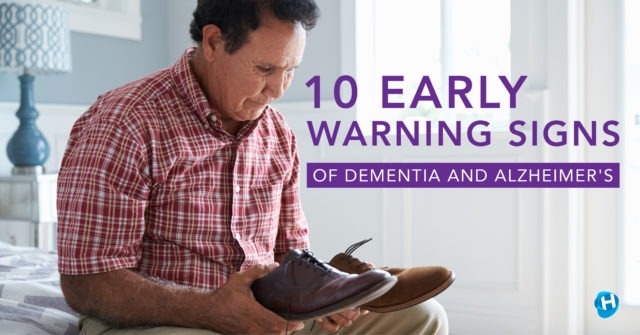During the next 10 years, this number likely will increase to more than 350,000. This estimate represents only people who have been diagnosed with a form of dementia, but there are likely thousands more who go without treatment because they don’t know the symptoms. Learn to recognize the early warning signs of dementia and Alzheimer’s.

10 warning signs of dementia
- Memory loss that disrupts daily life: This can include forgetting recently learned information and important dates such as birthdays and holidays, or asking for the same information repeatedly.
- Challenges in planning or solving problems: You might have trouble working with numbers while paying bills or planning an activity, like making a grocery list.
- Difficulty completing familiar tasks at home, work, or leisure: Driving to a familiar place may become challenging. You might find it difficult to remember the rules to a familiar game.
- Confusion with time or place: You might become confused with the time, date, or season. You could forget where you are, which can cause confusion.
- Trouble understanding visual images and spatial relationships: This could make it difficult for you to judge distances or read signs, which can make it dangerous to drive.
- New problems with words in speaking or writing: You may find it difficult to join or follow a conversation. It also becomes increasingly challenging to find the right words.
- Misplacing things and losing the ability to retrace steps: You might put items in unusual places and be unable to retrace your steps. This can lead you to accuse others of stealing.
- Decreased or poor judgment: This includes giving large amounts of money to telemarketers and sharing personal banking information online. You may become less inclined to keep yourself clean.
- Withdrawal from work or social activities: As a result of other changes you experience, you might become withdrawn from activities you usually participate in. You may find it difficult to follow a favorite sports team or keep up with a club.
- Changes in mood and personality: In addition to other symptoms, you might experience depression and anxiety. You could become suspicious or fearful of others and express discomfort in your home or at work.
What to do if you recognize the signs
If you or someone you know is experiencing these warning signs, make an appointment with your doctor, who will perform tests. After a thorough exam, you may be referred to a neurologist, psychiatrist, or psychologist.
Do your research. The Alzheimer’s Association is an excellent resource that provides information about dementia and Alzheimer’s.
Talk to someone. You are not alone. The Alzheimer’s Association offers support groups and educational seminars across the U.S. Find one near you.
Related Posts:
